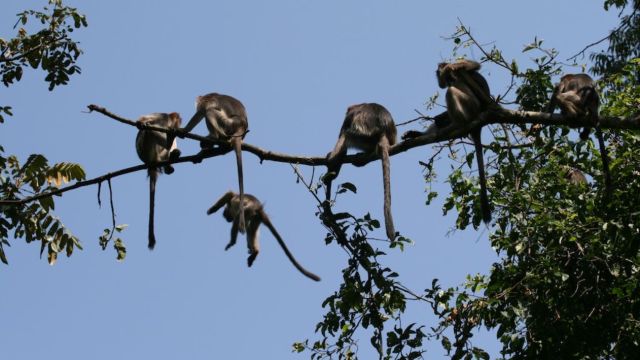Endocrine-active phytochemicals in primate diets: prevalence across the order

One overlooked aspect of ecology that may influence health and fitness is the interaction between vertebrates and endocrine-active phytochemicals (EAPs). These plant compounds mimic endogenous hormones and in doing so alter gene transcription, physiology, and behavior. Medical, agricultural, and zoo research have focused much attention on EAPs, especially phytoestrogens; however, much less is know about these compounds in wild animal diets. To examine the prevalence of EAPs in primate diets, we screened primate plant food items for estrogenic activity at ERβ using transfection assays and determined the percentage of feeding time focused on estrogenic plants by primate species of Uganda.
We found that most estrogenic plant foods are legumes or figs, two important plant families for primates across the tropics that make up an average of 23% of total diet based on a sample of 50 primate species. We are currently screening additional primate plant foods from across the tropics, as well as human foods from hunter-gatherer societies, in our Primate Environmental Endocrinology Laboratory (PEEL) at Indiana University to improve understanding of the distribution of EAPs across plant parts and phylogeny and clarify the ecological role of these compounds in plant-animal interactions.
As primates may also encounter a number of anthropogenic endocrine-disrupting chemicals (EDCs) through exposure to pollutants from agriculture, urbanization, and/or pest control, we are also examining relationships between EDCs and land use. By conducting comparative studies of primate diets focused on endocrine-active compounds, we will be better able to understand the relative importance of dietary niche, phylogeny, and geographic location to variation in chemical exposure and potential threats to vulnerable primate species from this exposure.
Michael Wasserman is assistant professor of Anthropology and Human Biology at Indiana University Bloomington. From 2013-2016, he was assistant professor of Environmental Science and Policy at St. Edward’s University in Austin, Texas. Prior to that, he was a Tomlinson postdoctoral research fellow and instructor in the Department of Anthropology at McGill University from 2011-2013. He received his PhD from the Department of Environmental Science, Policy, and Management at the University of California, Berkeley, in 2011.
His undergraduate degrees are in Anthropology (BA) and Zoology (BS) from the University of Florida. His research interests include primate ecology and evolution, environmental endocrinology, nutritional anthropology, evolutionary medicine, and conservation and sustainability. His is currently examining ecological and evolutionary relationships between wild primates and their estrogenic plant foods, with relevance to understanding the roles of endocrine disruptors in primate conservation, human evolution, and modern human health and diet.
Location
Seminar room 2/3, 120 McCoy Circuit, 2600 Canberra
Speaker
- Dr Michael Wasserman, Indiana University Bloomington
Contact
- Dr Justyna Miszkiewicz02 6125 9295